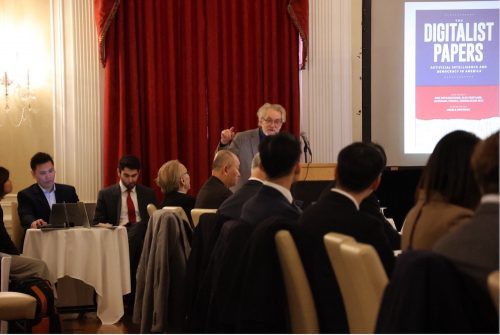By Arno Mikkor, President.ee
September 29, 2017

Presidents, prime ministers, ladies and gentlemen,
The first naturally digital generation will be almost middle-aged by 2025. Yet, most digital states they are still to be born. How long do people in otherwise developed countries have to manage the cyber world without the support of their states? For how long must people of Europe live without universal, time-stamped, digital signatures accepted all over our Europe? We do provide passports, they are a safe means for identification, to our citizens in analogue world. We recognize these passports cross-border and globally.
What about the cyber world? Are our citizens protected by our states? Do they have the means to identify each other online, securely, safely and in real time? I think not yet. And this is why you have gathered here in Tallinn today to seek urgent solution to this situation where our people and our business – they are online, but our states have left them alone there.
We often deplore the power of the internet giants, yet give our citizens no other option than to rely on those same giants for safe identification and therefore safe communication and transacting online. Even those who provide at home the digital ID, even those are not able to help their citizens to transact and communicate safely cross-border. There are even a few states where digital signatures are mutually recognized by law, but unfortunately not practically – they are not practically applicable online, these agreements. This must change.
Digital society could do so much to help those living in rural areas – they face the heaviest burden to travel to government offices and businesses. Digital services would also help those with lower incomes – digital services are cheaper to use, much cheaper than those on paper. They are a big equalizer. Big businesses, rich people – they have their means of managing big bureaucracies, but simple people suffer in the hands of heavy bureaucracies. Digital services mean also that people with irregular working hours or high family care burden – they are also usually vulnerable groups of the society – they can also access government services 24/7. It will remove lots of stress from their life of having to take time off to administer their lives.
I am President to digital society which has fully come digital and has done this with the support of its government. This support is delivered in four elements, every single one of them is important:
– we have a law base to make transactions in analogue world and in digital world legally equal;
– we have digital identification for safe exchange of information on universal platform;
– we have digital government services using the same universal platform as our businesses are using;
– we have possibility to create private digital services through the same platform as the government does.
We built our system of e-government so that it would meet people’s expectations and at the same time be affordable for a middle-income country. It also made government accessible from abroad, making state somewhat portable because our citizens are freely moving, they have the state in their pocket.
Going digital – this was also an opportunity of radical rethink and simplification because simply making an existing paper process digital is not such a good idea. In some ways, the current public processes, paper processes, they are like fossil fuel – they have formed over generations of people and lawmakers, getting more and more complex over time, and more and more political compromises weave their way into these regulations. This way bureaucracy grows and if you now simply digitalise your big bureaucracy, you have a machine of heavy bureaucracy. So digitalising actually is also an option to simplify radically.
Our society here has undergone a disruption so that Estonian people and businesses now are fully in digital environment in dealings with the state and with their private partners. The disruptive innovation from Estonians – this is not technology. The innovation actually lies elsewhere – the process of bringing business, people and government together, this has guaranteed our society that all people, everyone, benefit from digital services.
It took quite some effort to get everyone across all generations and social groups to use it. But we eventually did manage, even for the older people, who soon realized the advantage of using a PC to communicate with their pension office or their bank, rather than taking a bus. And private sector services also have to be cheaper online, than they are on the paper or in the offices. Banks offer their services free.
Digital ID is part of every regular ID-card in Estonia already for last 16 years. Digital identity is automatically created at the birth, a doctor enters the details of a birth into the system, and without the doctor herself recognising this in the background, the system is creating digital identity for a baby. Parents later add the name, of course, without going to any office. And the digital citizen is born.
So digital services can offer seamless coming into this world, seamless life in Europe for all our citizens if we take it in our hands to guarantee for them. But this is not the only thing which we need to do, of course. One thing is identity, one thing is digital services. There is the other side, there is the question of security. Our people need to be protected in the cyber world. The way they can be protected will never be technology, only technology. Yes, it will be technology, but it will also always be training and teaching. There is never getting away from that. I call it cyber hygiene. We have taught centuries ago our citizens to wash hands to stay safe, it´s exactly the same today, in digital world, in digital services.
If you want to try, some of our e-services are also open to e-residents – people from elsewhere, from your countries as well. These citizens are called e-residents. They can try how it feels never to worry about who will be talking to you in internet.
There is no obligation to go digital, every service can also be delivered here in Estonia on paper. But it is simple, it is available. Our people are lazy, I am quite sure your people are relatively lazy if afforded, as well. Everybody uses these services and get very angry when they are down.
We must go for inclusiveness, not high end. And we must go for reliability, not complex. And we must aspire for scope and scale, make digital government so attractive for everybody that businesses will have mass market because we call it inclusiveness, but they call it mass market. It´s mutually very useful and appetising. This means, of course, that you need your digital states always to be scalable. It must be built like a star – there is in the nucleus something common happening and there are rays around it. Every ray represents a person or a business and they only come together in the nucleus only for one need – to make sure they know who the other side is.
You cannot build digital societies like a train. In a train you enter the first wagon and then walk through it to the wagon you happen to need. The services in a star are scalable, endlessly. The services in a train are not at all scalable. We must not make these errors.
The initiatives which are contained in the European Union’s Digital Single Market Strategy can help to progress towards cross-border digital services on an EU-wide basis, based on the principles of once-only or digital by default. The government action plan aims to get rid of complex, paper-based and duplicated processes to make Europe’s single reality in the digital age. We need initiatives to give people clear digital advantage, we need innovation, growth and jobs through a strong single market. The joint call to have this by 2018 is extremely important, because we absolutely have to maintain the pressure for final agreement on all the proposals.
These sorts of benefits would not be possible if people did not trust in the digital environment. They have to be sure that their data does not get lost, stolen or manipulated. And that is why ensuring privacy and cybersecurity has been a pre-requisite for building our digital government. I speak from heart and I know your people will also need to build this trust gradually into digital markets.
In Estonia’s view and experience, the commitment to privacy and cyber security make the progress into digital society possible. And we always work hard because we as a country, we want to stay online – not go back offline because people would not trust digital state anymore.
In the Estonian system every citizen has a complete overview of who has accessed their data. The data is in the state servers, but belongs to people. And snooping in the state servers is criminal offense. Guaranteeing and safeguarding trust is not an easy task. It requires investment, it requires time and constant effort. We know there are risks in technology but there are also always advancements which help us to counteract these risks. We can say that Estonian cybersecurity know-how and arrangements are really battle-tested.
We continue every day to face cyber incidents, I don´t want to hide that at all. We deal every day with cyber criminals. All this experience has simply shown us how to mitigate these risks and threats. This can only be done in cooperation of private actors. It´s not possible that governments do it alone, it´s not possible that business do it alone. Cyber hygiene teaching is a common effort to everybody.
It is not without similarities to regular street space – there are risks, and we handle them, we keep our citizens safe on the street, but we do not abandon neither citizens nor the streets because there are risks there may be crooks out there.
Having explained how digitally disrupted society works and called upon you to give the same opportunities in cyber world to all our European citizens and do this in a cross-border format, I need to talk also honestly about adaptation to such a disruption. We must immediately start to think about how as a society in a digital world we will function.
We must not take technology simply as better industrial processes and therefore job losses. In fact, remarkable amount of jobs created by technology development is surprisingly neutral to the occupations or education levels of the citizens. You might call egalitarian opportunities even – the opportunities what the digital world is offering. They are not reserved to wise, well-educated and tech-savvy. Think of youtuber, or someone selling handicraft online, or renting their property via Airbnb. It´s an enabler for all and the new jobs are created every day.
We see our people offering their services or selling their goods globally, residing in no particular country. Such a world would require a safe dock for educational, health care, social services. Our people want these services, they want to consume them, but they do not want them under the current industrial model what we have to offer them. 12 months a year in one country, in one job, maybe two at the maximum, digital nomads are ready to pay taxes, but they want the services everywhere globally. This is the challenge we need to somehow make sure that they stay connected because otherwise they opt out.
Younger people already now when they want to travel and work and do not fit into our industrially designed social benefits models, they opt out. We need to think how to keep them in because they want to stay in, but the effort to stay in one place, one job permanently or with certain aloud gaps in order not to lose benefits – this simply does not work for them and they are not ready to give up on technology, they rather give up on our current models.
We must find the ways already now of thinking of this next social disruption and tackle it as quickly as we can to make states portable, to make sure that services will be offered as a safe dock, not against the demand to stay in one country in one town, have the legal address in one place only, to work in one or two countries only. This is the next disruption, this is the disruption we must already now start working with. I know we are still grabbling with the last one, removing digital borders and getting our governments online to be there together with our people and businesses. But we see already that the next disruption is there. Right now what we try to do is we try to understand who, which enterprise should pay taxes where, global enterprises. Our citizens will be global soon. The tax river from the jobs in industry will not be there anymore, we have to fly like bees from flower to flower to gather those taxes from citizens working in the morning in France, in the evening in UK, living half a year in Estonia and then going to Australia. I believe that we in Europe have a competitive advantage to do so over other regions of the world, because we already have at least some understanding, some thinking of portable social systems, free movement of labour. We are used to our people moving. All we need to do is agree among ourselves how we put our states into their pocket.
I am quite sure that by this evening after having talked through all those issues our people and businesses will feel far less alone in cyberspace than they did yesterday. They will see that their governments are coming with them to support them, also in the cybersphere to keep them safe and secure there and to accept that in the future their lives will be different and their states are adapting to make sure that these different lives are similarly supported.
I wish you a wonderful Digital Summit here in Tallinn!










